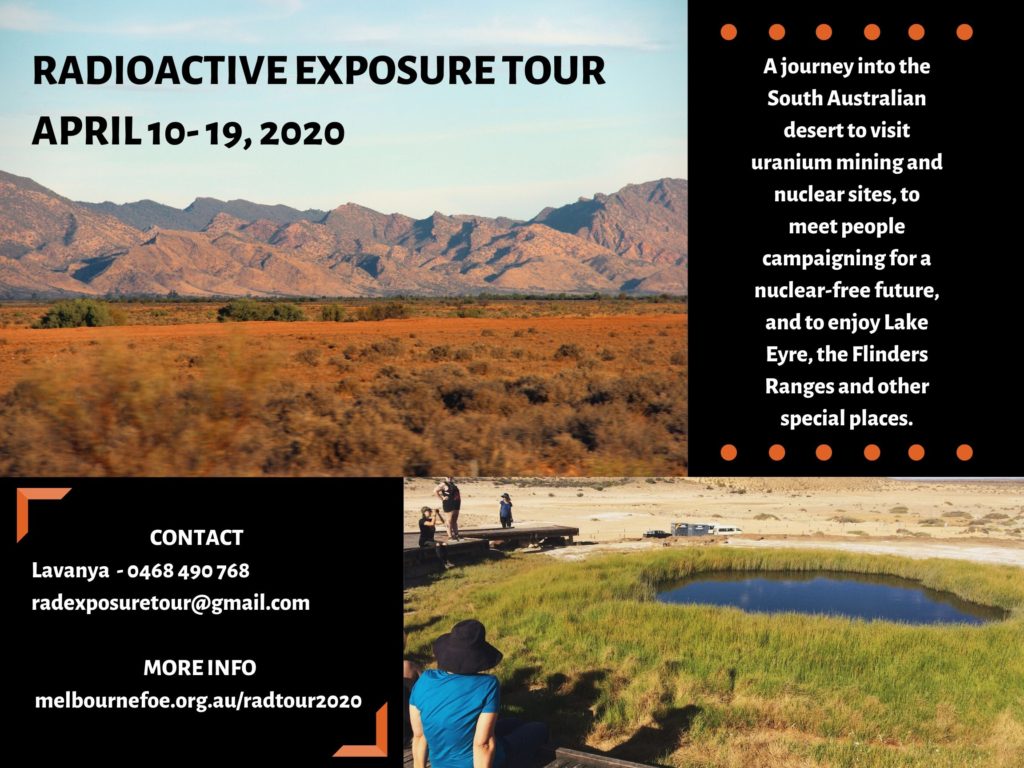from David Noonan:
Olympic Dam Alert: BHP propose a major new Evaporation Pond 6 for radioactive acid liquor wastes that will continue deaths of hundreds of birds each year
The federal government are inviting comments on BHP’s “Olympic Dam Evaporation Pond 6” EPBC Act Referral 2019/8526 (scroll down to Date of Notice 21/10/2019).
Public submissions are only open until cob Monday 4th Nov 2019, see info on how to do so at end of this e-mail.
Please consider making a brief submission, key Recommendations are provided below, along with a Background Briefing Paper and a feature press article “BHP vs Birds”.
For info see “Migratory Birds at Risk of Mortality if BHP Continues Use of Evaporation Ponds” a 3 page Briefing written by David Noonan for the ACF, Friends of the Earth and Conservation SA (30 June 2019)
see “BIRDS VS BHP: Evaporation ponds at BHP’s Olympic Dam mine are killing hundreds of birds” article in The Advertiser 10 July 2019
Hundreds of birds are dying each year after mistaking Olympic Dam’s evaporation ponds for wetlands. Environment campaigners want the miner to stop using them…
A set of Key Recommendations on these issues to please make to the federal government:
- The federal government must subject BHP’s Olympic Dam Evaporation Pond 6 Referral to a public environmental impact assessment process
The federal government must not just approve this major new Olympic Dam Evaporation Pond 6 on the basis of limited non-independent BHP referral documents. Federal responsibilities to protect Matters of National Environmental Significance require the rigor and transparency of a public environmental impact assessment process. BHP can-not be allowed to be the sole arbiter over continued and unnecessary deaths of hundreds of birds each year on Olympic Dam acid liquor evaporation ponds.
- BHP must stop the use of Evaporation Ponds in order to reduce mortality to protected Bird Species
The federal government should not approve or allow BHP’s proposed major new Evaporation Pond 6, which will contribute to the deaths of hundreds of birds at Olympic Dam.
The federal government should place Conditions to require that BHP: “must not construct Evaporation Ponds for the purpose of the expanded mine”; and to: “phase out the use of Evaporation ponds as soon as practical”.
This is consistent with the federal EPBC Act Assessment and Decision in Fauna Approval Conditions 18-21 (EPBC 2005/2270, Oct 2011) to protect Matters of National Environmental Significance in Listed Bird Species and the 21 Listed Migratory Bird Species found in the area, from mortality at Olympic Dam. These conditions must now be applied uniformly across the entire Olympic Dam operation.
The federal government must require BHP to prevent and limit impacts and mortality on Listed Bird Species protected under both the federal EPBC Act and the SA National Parks and Wildlife Act.
- BHP Olympic Dam operations should be assessed in its entirety with the full range of project impacts subject to public consultation
Given that copper-uranium mining at Olympic Dam is a controlled “nuclear action” and Matter of National Environmental Significance (NES) under the federal Environment Protection and Biodiversity Conservation Act 1999 (EPBC Act), the integrity of environmental protection requires that the entire Olympic Dam operation be subject to impact assessment so that regulatory conditions can be applied “to consider impacts on the whole environment”.
This is consistent with a key Recommendation by the federal Depart of Environment (“Olympic Dam expansion assessment report EPBC 2005/2270”, Sept 2011, 7. Existing operation, p.62):
“… it is recommended that conditions be applied to the existing operation so that the entire Olympic Dam operation (existing and expanded) is regulated by a single approval under the EPBC Act”.
At a minimum, BHP’s Oct 2019 Olympic Dam Evaporation Pond 6 referral must now trigger a public environmental impact assessment which includes assessment of impacts of the associated “BHP Olympic Dam EPBC Referral 2019/8465 Tailings Storage Facility 6” (to be larger in area than the CBD of Adelaide AND to be up to 30 metres high at the centre of the tailings pile, around the height of a 10 story building) – that BHP applied for in June 2019 and on which the federal Environment Minister is yet to make a decision.
BHP should not be allowed to ‘game’ the EPBC Act Referral system with multiple partial and limited referrals to try and avoid the scope of a warranted comprehensive public assessment of cumulative environmental impacts.
Submit your comments by cob Monday 4th Nov 2019:
Please send your comments on this BHP EPBC Olympic Dam Referral and quote the EPBC Act reference number2019/8526 and the full title of the referral:
“BHP BILLITON OLYMPIC DAM CORPORATION PTY LTD/Mining/Roxby Downs/South Australia/Olympic Dam Evaporation Pond 6”
To Email: epbc.comments@environment.gov.au
Referrals Gateway
Assessment & Governance Branch
Department of the Environment and Energy
If you require further information contact the federal government Referrals Gateway on 02 6274 2496 or email epbc.referrals@environment.gov.au
See info on ‘How to make a submission’ at:
http://www.environment.gov.au/epbc/public-notices/assessment-help#referrals
And scroll down to: Invitations for public comment, Referrals.


